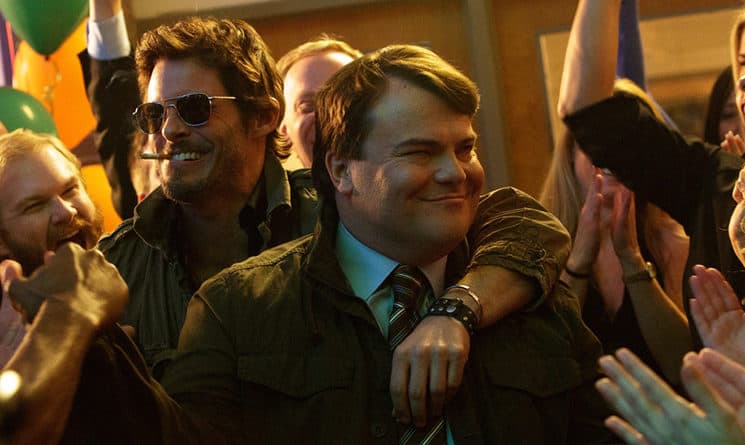In “The D Train,” Jack Black stars as Dan Landsman, a sad-sack loser living in the suburbs of Pittsburgh who’s in charge of his high school class’ 20-year reunion committee. The upcoming reunion seems to be in as dire shape as Landsman is — none of the class of ’94 seems to want to come back. Up late watching TV, Landsman spots the most popular guy in school, Oliver Lawless (James Marsden) in a Banana Boat commercial, and he hatches a plan. If he can get Lawless, an actor who’s the face of a “national campaign,” to the reunion, everyone else will follow.
And that’s where things get complicated. Landsman’s plan involves faking a business trip out to Los Angeles and lying to his wife and his technophobic boss (Kathryn Hahn and Jeffrey Tambor, both criminally underused here). Once in L.A., Landsman meets up with Lawless and they party it up, hopping from bar to bar, doing coke in the bathroom, and trying to impress actor Dermot Mulroney (in a cameo as himself). They stumble back to Lawless’ crummy apartment and, fueled by drugs and booze and maybe a little nostalgia, they hook up.
The aftermath of that hook-up drives the rest of “The D Train.” Landsman returns home, wracked with guilt over his deceptions and now unsure that he wants Lawless to come to the reunion. But Lawless shows anyway and crashes at Landsman’s house, where he instantly charms Landsman’s wife and son, Zach (Russell Posner). As the reunion approaches, Landsman struggles to keep his secret under wraps, impress his classmates, and somehow get closure with Lawless.
There are a lot of problems, and they all lead back to the writing and directing team of Andrew Mogel and Jarrad Paul.
It all goes poorly, of course, and so does the movie itself. There are a lot of problems, and they all lead back to the writing and directing team of Andrew Mogel and Jarrad Paul. This is their first feature — their previous collaboration was on the screenplay for Jim Carey’s “Yes Man,” and it’s clear that subtle character studies are not their strong suit. “The D Train,” though, is a broad comedy awkwardly shaped to fit inside an indie flick. Two men taking their friendship to the next level is ground that’s been covered already by Mike White (who has a small role here) in “Chuck & Buck” and by Lynn Shelton in “Humpday.” Those were small movies, though, with low budgets and no eye toward a wide studio-backed release. There was room to be weird and dark, of course, but also room to explore each character’s motivations and to dig deep into relationships.
“The D Train” offers no such luxuries. Thankfully, it doesn’t lean on gay-panic jokes and it mostly handles the story as maturely as it can. But it’s all surface-level stuff.
As Landsman, Black falls back into his familiar acting tics — crazy expressions, moments of blustery bravado, and some “School of Rock”-style turns of phrase that seem out of place for the character. He’s sad and seems unfulfilled by life, but we never quite learn why. And, after the hook-up with Lawless, Landsman’s character remains similarly vague. He acts out, shouts, gets wasted, and torpedoes all of his family and professional relationships, but there’s no clear underlying reason. Is he questioning not just his sexuality, but his whole life? Did the night with Lawless drag Landsman out of the closet? Is he realizing that, like Lawless, his sexuality is more fluid than he thought? Does he have regrets? Does he want it to happen again? In short: who knows? Black goes nutty, and Mogel and Paul seem to hope that’s enough to convey whatever it is they’re going for.
Lawless ends up being a one-note character, too. Marsden, to his credit, does his best with the material — he’s a capable comedic actor and brings what little depth he can to the role. The problem is “The D Train” shifts wildly in tone, and broadly funny moments look clumsy alongside darker, more character-driven scenes later on. The movie is never sure what it wants to be, nor is it sure what it wants Black or Marsden to be.
Nor are there any stakes. Awkward, dark comedies like the ones “The D Train” positions itself as thrive on things spectacularly falling apart and wring a lot of material out of characters sorting through the wreckage of their lives. But it’s not spoiling too much to say that doesn’t happen here. The film’s optimistic final moments are the last in a series of inexplicable turns. It’s less a true ending than just an easy way to let the audience, the characters, and the filmmakers off the hook.
Those are flaws in any film, but they’re especially glaring in a movie that’s ostensibly concerned with identity and nostalgia and the clash between fantasy and reality. There’s a good movie hidden somewhere in the script for “The D Train.” It’s too bad we got the first draft instead.

